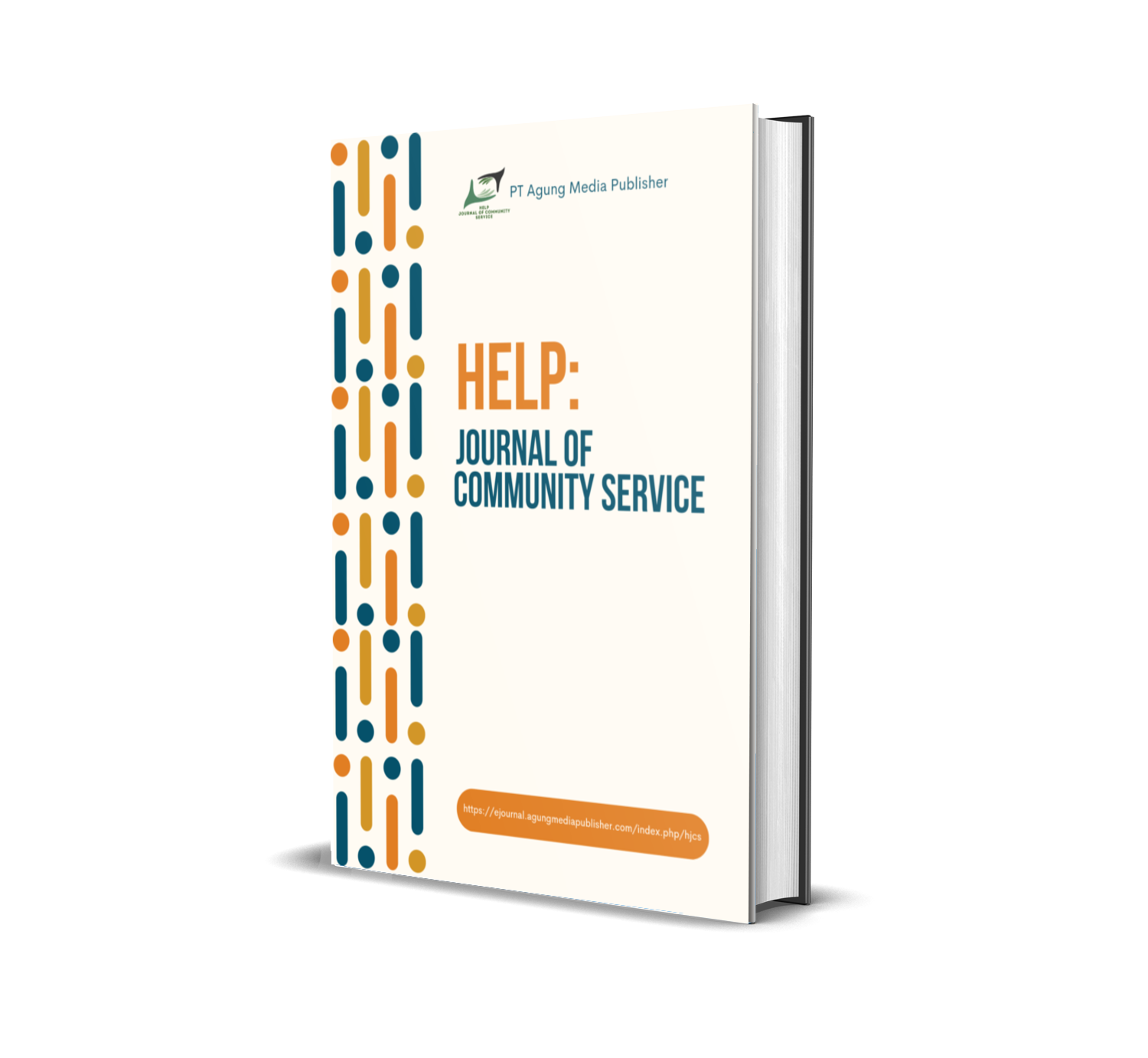Building Self-Confidence among Elementary Students in Parepare City through a Social-Educational Intervention Program
Main Article Content
Abstract
Self-confidence plays a vital role in children’s psychological development and influences their academic, social, and emotional achievements. However, many elementary school students struggle with low self-confidence, which can hinder their learning motivation and personal growth. This community service program was conducted at UPTD SD Negeri 5 Parepare to enhance students’ self-confidence through a social-educational intervention. The program was designed with three stages: preparation, implementation, and reflection. Activities included interactive and reflective learning experiences adapted to the students’ developmental levels. The materials addressed self-awareness, setting realistic goals, positive self-talk, stepping out of the comfort zone, maintaining appearance, building positive social environments, and learning from experiences. The implementation revealed significant improvements in students’ engagement, self-expression, and self-awareness. Pre- and post-activity reflections indicated that students became more confident in participating, expressing ideas, and interacting with peers. The findings suggest that integrating social and educational strategies into character education can effectively foster self-confidence among elementary students. This program demonstrates the potential of social-educational interventions to strengthen personal growth and learning motivation in young learners.
Downloads
Article Details
Section

This work is licensed under a Creative Commons Attribution-ShareAlike 4.0 International License.
You are free to:
- Share — copy and redistribute the material in any medium or format for any purpose, even commercially.
- Adapt — remix, transform, and build upon the material for any purpose, even commercially.
- The licensor cannot revoke these freedoms as long as you follow the license terms.
Under the following terms:
- Attribution — You must give appropriate credit , provide a link to the license, and indicate if changes were made . You may do so in any reasonable manner, but not in any way that suggests the licensor endorses you or your use.
- ShareAlike — If you remix, transform, or build upon the material, you must distribute your contributions under the same license as the original.
- No additional restrictions — You may not apply legal terms or technological measures that legally restrict others from doing anything the license permits.
Notices:
You do not have to comply with the license for elements of the material in the public domain or where your use is permitted by an applicable exception or limitation .
No warranties are given. The license may not give you all of the permissions necessary for your intended use. For example, other rights such as publicity, privacy, or moral rights may limit how you use the material.
How to Cite
References
Adamovic, M., Gahan, P., Olsen, J., Gulyas, A., Shallcross, D., & Mendoza, A. (2022). Exploring the adoption of virtual work: the role of virtual work self-efficacy and virtual work climate. International Journal of Human Resource Management, 33(17). https://doi.org/10.1080/09585192.2021.1913623
Akbari, O., & Sahibzada, J. (2020). Students’ Self-Confidence and Its Impacts on Their Learning Process. American International Journal of Social Science Research, 5(1). https://doi.org/10.46281/aijssr.v5i1.462
Allo, M. D. G., & Priawan, A. (2019). Students’ Self-Confidence in Speaking Skill. Jurnal Studi Guru Dan Pembelajaran, 2(1). https://doi.org/10.30605/jsgp.2.1.2019.1263
Allobaney, N. F., Eshah, N. F., Abujaber, A. A., & Nashwan, A. J. J. (2022). Professional Self-Concept and Self-Confidence for Nurses Dealing with COVID-19 Patients. Journal of Personalized Medicine, 12(2). https://doi.org/10.3390/jpm12020134
Bozgun, K., & Akin-Kosterelioglu, M. (2023). Self-confidence as the predictor of metacognitive awareness in high school students. Participatory Educational Research, 10(1). https://doi.org/10.17275/per.23.20.10.1
Fuadah, L. (2019). Kognitif Sosial Tunawisma di Kota Semarang. IJTIMAIYA: Journal of Social Science Teaching, 3(1). https://doi.org/10.21043/ji.v3i1.5964
Ginting, N. G. (2023). Membangun Kepercayaan Diri Anak Sejak Dini Dan Membangun Karakterk Anak. Journal Sains Student …, 1(1), 165–178.
Gomes, M. C., Perazzo, M. F., Neves, É. T., Martins, C. C., Paiva, S. M., & Granville-Garcia, A. F. (2017). Oral problems and self-confidence in preschool children. Brazilian Dental Journal, 28(4). https://doi.org/10.1590/0103-6440201601295
Gonzalez-DeHass, A. R., Furner, J. M., Vásquez-Colina, M. D., & Morris, J. D. (2017). Pre-service elementary teachers’ achievement goals and their relationship to math anxiety. Learning and Individual Differences, 60. https://doi.org/10.1016/j.lindif.2017.10.002
Jelita, S. K. (2024). Upaya Guru Meningkatkan Kepercayaan Diri Siswa. Seminar Nasional Dan Publikasi Ilmiah 2024 FIP UMJ, 800–809.
Kamaruddin, I., Tabroni, I., & Azizah, M. (2022). Konsep Pengembangan Self-Esteem Pada Anak Untuk Membangun Kepercayaan Diri Sejak Dini. Al-Madrasah: Jurnal Pendidikan Madrasah Ibtidaiyah, 6(3), 496. https://doi.org/10.35931/am.v6i3.1015
Lestari, H. W. (2019). Kepercayaan Diri Anak Dalam Bermain Di Tk Kelompok a Gugus Paud Viii Kecamatan Sleman. Pendidikan Pendidikan Anak Usia Dini, 6, 551.
Nita, N. K. A. A., & Agustika, G. N. S. (2023). Efikasi Diri dan Regulasi Diri Berpengaruh terhadap Motivasi Belajar pada Siswa. MIMBAR PGSD Undiksha, 11(1), 81–90. https://doi.org/10.23887/jjpgsd.v11i1.58234
Pečiuliauskienė, P. (2023). Instructional clarity in physics lessons: Students’ motivation and self-confidence. Cogent Education, 10(2). https://doi.org/10.1080/2331186X.2023.2236463
Salim, A. (2022). General Self-Confidence and Its Implication On Students’ Achievement In Oral Presentation. JEELS (Journal of English Education and Linguistics Studies), 2(2). https://doi.org/10.30762/jeels.v2i2.95
Sholiha, S., & Aulia, L. A.-A. (2020). Hubungan Self Concept dan Self Confidence. Jurnal Psikologi : Jurnal Ilmiah Fakultas Psikologi Universitas Yudharta Pasuruan, 7(1). https://doi.org/10.35891/jip.v7i1.1954
Sihotang, E., & Herawati, J. (2023). Peningkatan Kepercayaan Diri Anak Usia Dini Melalui Kegiatan. Jurnal Pendidikan Sosial Dan Humaniora, 2(3), 11566–11572.
Trecy Rosefine, A., Sundari, N., & Anesty Mashudi, E. (2024). Pengembangan Kepercayaan Diri Anak Usia Dini melalui Kegiatan Show and Tell. Murhum : Jurnal Pendidikan Anak Usia Dini, 5(1), 662–676. https://doi.org/10.37985/murhum.v5i1.635
Wahyuni, S., & Nasution, R. N. B. (2017). Upaya Meningkatkan Kepercayaan Diri Anak Usia Dini Melalui Metode Bercerita di Kelompok B RA An-Nida Sri. Raudhah, 5(2), 1–19.


